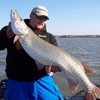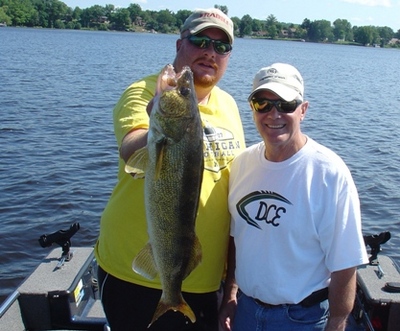Recent high water has made fishing locally on the Wisconsin River system a bit more of a challenge in the past week, but water clarity and levels are quickly returning to normal. The increased flow, while offering some navigation and presentation challenges to anglers, has also helped locate numbers of fish in predictable areas. As top of the line predators, the muskies have been active, taking advantage of the current breaks to funnel prey for them to ambush. Large rubber or hybrid jerkbait-style lures such as Bulldawgs and Tyrants have been working well, with brighter colors producing the best due to the dirtier water conditions. Crankbaits offering large silhouettes such as 10" Jakes and 9" Shallow Czars have also been working very well; again, brighter patterns have been the most productive. There has been a solid bucktail and surface bait bite on the lakes of North-Central Wisconsin for muskies the past few weeks, including the waters of Marathon, Lincoln, Oneida, and Vilas counties. The double-ten bucktail bite continues to be producing good action from the muskies. Lures such as the Mepps H210 worked over weeds and shallow rocks are producing fish consistently; a medium to fast retrieve has been best. Surface baits have also been working well, especially at night on the clearer lakes. Black or green prop-style or creeper baits like the Dictator are all accounting for fish.
The resident smallmouth bass population has been active, with good numbers of fish currently being found amongst the shallow wood and rocks. The morning and evening periods have held good action on buzzbaits or chugger-style surface lures, while numbers of fish are being caught during the day on both in-line spinners and crankbaits. The best spinner colors in both the Mepps Aglia and Aglia Long, the hottest in-lines recently, have been gold or copper with a dark dressing, or a bright body and dressing combination such as orange or chartreuse; for crankbaits, bright crayfish patterns, chromes, and firetiger have been tops. Look for structure such as rock/sand bars, downed trees, and bridge pilings that create current breaks; then work your presentation from shallow to deep until you find the depth holding the most active fish.
Walleyes locally have been using current breaks as well, with the fish using bridge pilings, stumps and logs, and rock/sand bars, similar to the smallmouth. Look for seams in the current and present crankbaits or jig-and-livebait offerings along them. There continue to be decent numbers of fish using the shallows, so don't overlook the "skinny" water, even during mid-day hours if there is good cover and structure present. Switching gears a bit, the walleye bite on Green Bay continues to be excellent, with large numbers of fish in the mid to upper twenty inch range available on a regular basis; a truly world-class fishery at the present.
Panfish remain available to anglers using small jigs or hooks tipped with livebait. Where present, lily pad beds and the deep edges of submergent vegetation are holding panfish, and should be fished thoroughly. Likewise, stump fields, blow-downs, and snags are also holding ample numbers of panfish; again, small plain hooks or jigs tipped with a piece of nightcrawler or a small leech have been working well. Fly-fishing in the morning and evening with tiny poppers and dry flies has also been an effective and entertaining manner in which to catch panfish.
http://www.wisconsinanglingadventures.com



